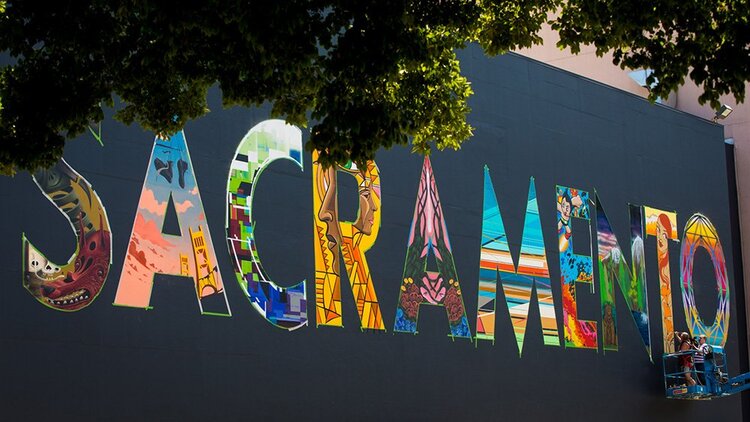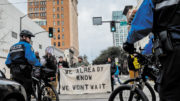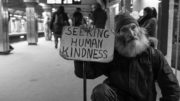Editor’s note: Sacramento refocuses on creating a more inclusive economy, post COVID, but the plan has a curious gap
Sacramento’s effort to build a fairer economy that lifts up everyone—put on hold during the COVID-19 pandemic—is back front and center and more important than before.
If all it took were catch phrases and good intentions, we’d be all set with the ScaleUP Sacramento inclusive economic action agenda that went before the City Council on Tuesday, Jan. 26. But it takes hard work, significant resources and not a little bit of luck, especially when other cities are competing for many of the same, high-paying jobs.
And it takes everyone pulling together, which makes an omission in the plan even more glaring: It ignores a citizens committee that is also supposed to play a key role in inclusive economic development—and that has been battling with City Hall for the last year over whether the city budget reflects racial equity.
Sacramento’s push for a fairer economy was sparked most recently by the March 2018 police killing of Stephon Clark, which spotlighted decades of underinvestment in Black and Brown neighborhoods—and a string of broken promises by city officials.
That led to a campaign to increase the Measure U sales tax in November 2018. After Mayor Darrell Steinberg pledged that a significant sum would go to needy neighborhoods, voters approved the additional half-cent, generating $50 million more a year.
But the coronavirus pandemic stopped the momentum for inclusive economic development.
Indeed, the pandemic has worsened racial disparities. And to avoid cutting public safety services as the economy and city tax revenues tanked, the city shifted millions in Measure U money meant for neighborhoods to police and fire services.
The Measure U Community Advisory Committee harshly criticized that diversion, particularly during the police reform protests prompted by the killing of George Floyd last May. The committee called for not funding the Police Department at all through the Measure U sales tax, and reallocating that $41.7 million for economic development, housing and homelessness.
The City Council did not go along. Ironically, the advisory committee’s latest recommendations went before the council’s budget committee earlier Tuesday. The citizens panel wants City Hall to immediately shift $15 million from police and fire, and pledge an additional $5 million a year, to “participatory budgeting” to let residents in disadvantaged neighborhoods choose projects to fund.
“We believe that Measure U funds can and should be used to intentionally and strategically address economic disparities based on systemic and institutionalized racism within and across neighborhoods,” the committee says in a letter to Steinberg and the council.
Two new council members, Katie Valenzuela and Mai Vang, support participatory budgeting.
But there’s continued resistance from top city officials, who say reallocating the money in the middle of the budget year would require cuts to essential services and possibly layoffs.
UPDATE: Flojaune Cofer, chairperson of the Measure U panel, told the budget committee that the city has over invested in public safety and under invested in inclusive economic development.
Steinberg replied that while he appreciates Cofer’s fight, the city is spending significant sums on housing, youth programs and neighborhood development. And he argued that without the half-cent sales tax hike, the city would be in a dire budget crunch.
The city also says that the citizens committee offers only non-binding recommendations on Measure U spending, not all inclusive economic development, and that three current members of the advisory panel and one former member are on that expert investment committee.
While ignoring the community advisory committee, the ScaleUP Sacramento plan does mention a panel of experts who are to guide city investments.
The plan is supposed to coordinate with the city’s racial equity initiative—a draft resolution also goes before the council on Tuesday—with nine strategies to be “prioritized through an equity lens.”
The plan is also supposed to mesh with the city’s green energy strategy and to build on investments already made with federal COVID relief money.
Using all sorts of economic development jargon, the 150-page plan includes plenty of lofty goals: Enhance regional industry “clusters;” deploy an inclusive workforce; develop innovation and entrepreneurship; integrate neighborhood development; and create a cross-connected corporate alliance.
There aren’t as many specifics to reach those goals.
The plan does include Sacramento becoming a global center on “future mobility.” The city is ahead of the game: It just received a $1.8 million state grant to install electric vehicle chargers at seven community centers and at public libraries. Sacramento got a head start on its goal to become America’s zero-emission vehicle capital, thanks to $44 million from the settlement in the VW emissions cheating scandal.
Also underway is Aggie Square near UC Davis Medical Center, a public-private partnership announced in 2018 between the city, UC Davis Health, private industry and other groups. The $500 million project is designed to bring thousands of jobs related to health care, technology and research. Some neighborhood advocates, however, question whether that project will improve or worsen equity and are suing to stop it.
But no one is debating the importance of more inclusive economic growth.
Before the pandemic, the Brookings Institution found that while the Sacramento region is relatively prosperous compared to other large U.S. metro areas, it is in the bottom third in economic growth and inclusion; more than one-third of residents struggle to make ends meet, and they’re disproportionately people of color; and Black and Latino workers are underrepresented in digital skill jobs of the future.

“The City needs to maximize the employment, ownership, access and participation of communities and groups that have traditionally been left out of the region’s growth,” City Manager Howard Chan writes in a letter accompanying the plan.
“If Sacramento simply pursues economic growth, but that growth is not inclusive and equitable, then we have not succeeded.”
UPDATE: The council endorsed the plan after amending it at Councilman Eric Guerra’s suggestion to explicitly emphasize the need for living wage jobs for working families and to work with labor groups on workforce training.
Mayor Steinberg said while there was a debate on development in Sacramento a decade ago, now there’s general agreement that “growth is good if it’s clean, if it’s green, if it’s sustainable and if it’s inclusive.”






Be the first to comment on "Build back better"